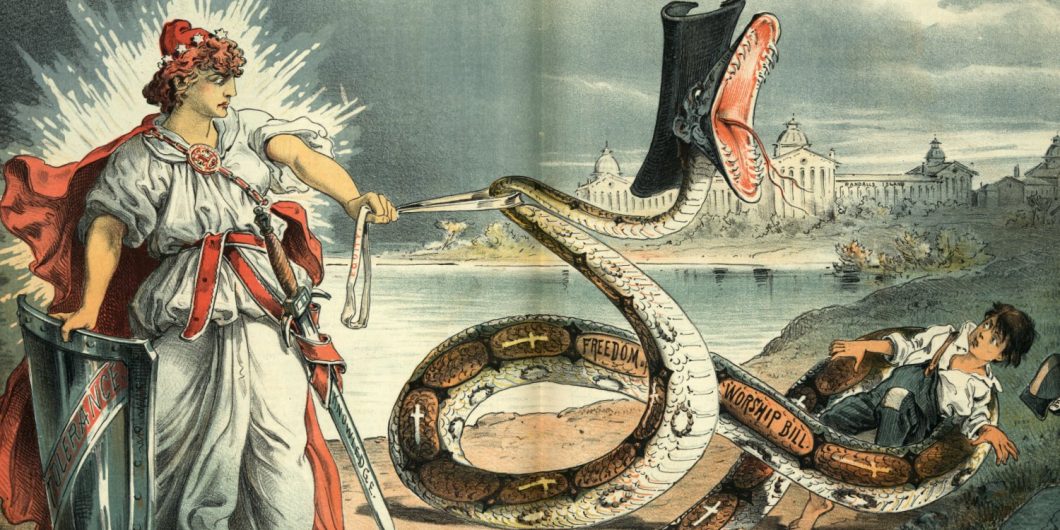Liberty, the Reason for Tolerance
Michael Thomas definitely points to an important political virtue when he suggests that tolerance is “the primary political virtue.” In this connection, it is interesting to reflect on how absent this virtue seems to be from the present-day consciousness. Instead of toleration, we have adopted acceptance or ostracism as our model. Toleration supposes that you can disagree with a moral or political stance of some sort, but nevertheless allow it to be practiced. By contrast, one cannot vocalize disagreement with certain practices today without facing immense pressure to conform to acceptance of them. The key to the presence of tolerance is non-acceptance. People must be willing to allow the rejection of some beliefs and practices for there to be tolerance. That is what it means to tolerate something: to allow some belief or practice to continue despite one’s own view that the belief or practice is mistaken, wrong, or immoral. Pushing for acceptance is an entirely different approach by having conformity at its essence.
We thus have two models that, in the abstract at least, do not necessarily violate liberty: one is the model of tolerance and the other the model of pressure towards acceptance. We could point to other views, such as Herbert Marcuse’s, which hold that tolerance is essentially repressive in that it maintains a majoritarian status quo. But the two models are enough to make our point: Thomas’ tolerant society faces self-referential problems. This ideal society must be intolerant of intolerance. This alone forces us to ask ourselves why we even care about tolerance. The answer is one that Thomas himself presupposes and employs in his defenses of tolerance, namely liberty. The value of tolerance is measured against that—making the primary purpose of the state to protect liberty.
Liberty is not, however, merely the lack of external impediments or simply the ability to do whatever one wants to do. As Locke notes, “liberty is not license.” “Liberty” is a moral notion, and what differentiates liberty from license is the moral concept of an individual’s basic, negative, natural rights to life, liberty, and property. Liberty is found when the natural rights of individuals are protected by positive law, which in turn protects the possibility of self-direction and thus the possibility of individual moral responsibility and pursuit of human good among others. We follow Locke in holding that this ultimately determines the purpose of the state, or more generally the political/legal order. As we note in The Realist Turn, “Liberty is not opposed to there being an ethical limitation on what people may do to one another. Indeed, liberty only exists within the context of such a limitation. The limitations that define liberty can be expressed in the language of rights; indeed, rights are a normative expression of those very limitations.”
An imbalance of power, in and of itself, does not imply either tolerance or intolerance. Liberty guarantees it.
It was indeed our very concern for tolerance that led us to develop our argument for natural rights from a neo-Aristotelian account of natural moral law. We wanted to show how a natural rights theory, which holds that liberty is the paramount value for the political/legal order, need not assume that liberty is the highest moral value tout court. Our crucial insight was that all ethical principles need not be of the same type or have the same function. Political principles, for example, can be based on but need not be reducible to principles of normative ethics. Politics is not ethics writ large. In other words, it is possible for there to be a morally legitimate political/legal order that protects people who have views and practices that are indeed morally wrong. The crucial issue is whether such views and practices violate individual rights. They are the link between the ethical order and the political/legal order. Politics need not be viewed as soulcraft, nor need its function be viewed as remaking society to accord with some moral ideal.
We would agree with Thomas that tolerance is an important tool, perhaps even the primary tool, in the protection of liberty. But it is not the only one, because it is easy enough to point out that we cannot tolerate everything. Some standards are required such as respecting the inviolability of individual natural rights. So let us follow Thomas in supporting his arguments for the importance of tolerance, but let us also recognize that we care about tolerance as a political virtue because it supports and operationalizes the primary political value of liberty.
Thomas might, however, demur and say that he is not presupposing the value of liberty in arguing for the political primacy of tolerance. Rather, he might instead claim that he is against the imbalance of power, not liberty. But presupposing the imbalance of power is a bad thing only raises the question of “why?” Much of human history has been marked by imbalances of power—some imbalances have been and might be still defended as being the best arrangements for achieving various social ends. So we cannot assume that ipso facto an imbalance is bad. There has to be a defense. Tolerance itself thus needs to appeal to a greater and more fundamental value that answers the question of why be tolerant. Liberty seems to be the most likely and best candidate for being that fundamental value. An imbalance of power, in and of itself, does not imply either tolerance or intolerance. Liberty guarantees it.

